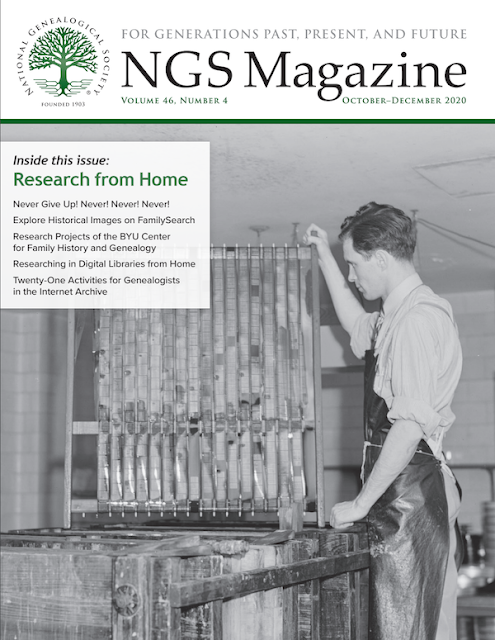The July–September 2020 issue of NGS Magazine, Volume 46, Number 3, is
available online in the Members Only section of the website. It will be mailed to members in the coming weeks.
EDITOR'S NOTE by Deb Cyprych
To paraphrase the authors of Woman Suffrage and Politics, Carrie Chapman Catt and Nettie Rogers Schuler, this issue “is dedicated on behalf of the women who have gone before to the women who come after”—and to all victims of sexism and racism.
American woman suffragists displayed astonishing determination in nine hundred campaigns to convince male voters to allow them to vote. Twenty-six countries gave women the right to vote before suffrage was finally ratified in the United States in 1920. In celebration of the centennial, dramatist Steffani Raff portrayed Emmeline B. Wells, a Utah suffragist, during the NGS Live! program; in this issue, she answers questions about how she developed her performance.
But the women’s suffrage struggle was not always based on equal rights, as Eileen Muccino points out in a history of the movement. Some leaders opposed the Fifteenth Amendment granting suffrage to African American men, in an attempt to persuade southern states to adopt women’s suffrage. For many years the national suffrage organizations rejected Black women, immigrants, and working-class women. Eventually the suffragists’ massive efforts shifted the tide of public opinion, and the Nineteenth Amendment was ratified by a one-vote margin. Some American women could not vote until long after 1920, however.
Two million women were members of the National American Woman Suffrage Association at its height. Kathy Petlewski presents resources for researching suffragists such as personal papers, newspapers, city directories, compiled publications, organizational records, and petitions. She also discusses possible reasons for lack of participation in the suffrage movement.
Voting records from before and after the passage of women’s suffrage may hold valuable genealogical information. Rebecca Whitman Koford describes uses for registration and turnout registers and provides an extensive list of digitized voting records. Her summary of the checkered history of American voting rights demonstrates sexism and racism for more than two centuries.
Thousands of women born in the United States, including many suffragists, lost their citizenship when they married unnaturalized immigrants. These women could not vote until they were repatriated, some as late ast the 1970s; others never repatriated. Rich Venezia outlines the history of the relevant laws and the records normally restricted to immigrant aliens in which native-born women appear.
In other articles, Janice Lovelace discusses diaries, letters, and records for researching the women settlers of the West, and Teresa Kelley and Robin Dwyer-Maurice profile repositories in the vicinity of Richmond, Virginia, to consider visiting before or after the 2021 NGS Family History Conference. In their columns, Paul Woodbury explains how spit samples are processed to reveal DNA results, and Carla Cegielski covers useful methods of cataloging book collections.
TABLE OF CONTENTS
Features
- NGS 2021 Family History Conference: Research Opportunities in Richmond, Virginia by Robin Dwyer-Maurice and Teresa Kelley
- Woman Suffrage from the Revolution to Ratification by Eileen Muccino, MA
- Buried Treasure: Voter Lists and Registrations by Rebecca Whitman Koford, CG, CGL
- Native-Born Aliens: The Laws and Records of Expatriated Women by Rich Venezia
- Resources for Nineteenth-Century Women Settlers in the West by Janice Lovelace, PhD
Departments
- PRESIDENT'S MESSAGE A Silver Lining and a Bright Future by Ben Spratling
- NGS NEWS
- From In-Person to Virtual Conference in Thirty Days: NGS 2020 Live! by Janet A. Alpert, FNGS
- NGS Announces 2020 Awards and Competition Honorees by Janet L. Bailey
- REFERENCE DESK
- Was Grandmother a Suffragist? by Kathy Petlewski, MSLS
- TECH TIPS
- Keeping Track of Genealogy Books by Carla S. Cegielski
- DNA DISCOVERY
- From Spit to Screen: The Journey of a DNA Sample by Paul Woodbury
NGS Magazine is published quarterly to update members of the National Genealogical Society on NGS activities and to provide genealogists with special information and guidance on conducting effective genealogical research. The magazine is sent to libraries by subscription. Online access to NGS Magazine is available only as long as membership is active.



















